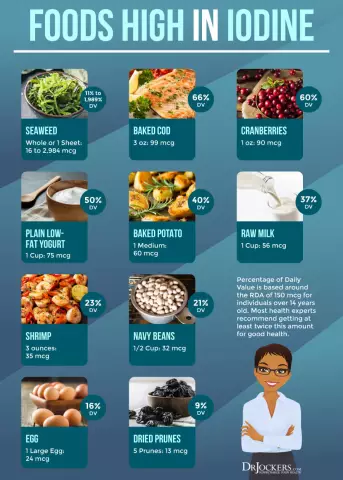- Author Rachel Wainwright wainwright@abchealthonline.com.
- Public 2023-12-15 07:39.
- Last modified 2025-11-02 20:14.
Excess zinc

Zinc is an important biogenic element that is constantly present in the cells of any organism. The body of an adult contains an average of 1.5-3 g of this substance. Zinc is mainly accumulated in bone tissue, skin, hair, and semen. It is impossible to overestimate the importance of this element for the proper functioning of the body, deficiency and excess of zinc negatively affect human health. The daily requirement for zinc is on average 8-25 mg per day. The danger of an excess of zinc, as a metal, in water and food for humans is low, since it does not accumulate. But long-term consumption of high doses of this trace element in food can lead to an excess of zinc in the body and the development of a number of adverse effects. The toxicity threshold for zinc is 600 mg / day (according to Professor A. Skalny), and the lethal dose is 6 g.
Causes of excess zinc in the body
Even a completely unbalanced diet cannot lead to a significant excess of zinc in the body. More often, an excess of the normal concentration of this trace element in humans is provoked by the intake of drugs and biologically active additives containing an excess of zinc in their composition. So signs of a clear chronic excess of zinc were found in patients who took more than 150 mg of the trace element per day. Occasionally, the packaging of food and beverages can pose a hazard, which contributes to the formation of highly toxic zinc compounds (sulfates, chlorides and oxides). So, isolated cases of zinc intoxication as a result of eating food stored in galvanized or completely zinc containers have been recorded. Poisoning with zinc and its compounds is also possible at work. Zinc oxide, chloride and sulfate are used to obtain glass,in the production of artificial fiber, zinc paints, ceramics, matches, dental cement, in the pulp and paper industry, for wood preservation, for tinning and brazing, etc. Excess zinc in the solid state and in the form of dust is relatively harmless. Zinc compounds pose a great threat to acute poisoning or chronic excess zinc.
Symptoms of excess zinc

Acute poisoning is caused by taking a large enough dose of a trace element at once. In this case, the symptoms of an excess of zinc in the body appear in a relatively short time. Nausea, vomiting, respiratory failure, erosion of the gastric mucosa, decreased function of the immune system may occur. When poisoning with zinc oxide through the respiratory tract, a sweetish taste occurs in the mouth, then thirst, suffocation, dry cough, pressing chest pain, drowsiness, chills. Oral intake of excess zinc in the form of salts causes a metallic taste in the mouth, burns of the mucous membrane of the digestive tract, nausea, vomiting, diarrhea, abdominal pain, cramps in the calf muscles, and a drop in blood pressure. Fibrous degeneration of the pancreas can become a symptom of excess zinc. An excess of normal blood glucose levels is often observed.
Chronic zinc intoxication can lead to deterioration of the condition of nails, skin, hair loss, weakening of the functions of the prostate gland, pancreas, liver, and the development of various autoimmune diseases. With a chronic excess of zinc, the absorption of copper, manganese, and iron from food decreases and their secondary deficiency occurs. One of the symptoms of excess zinc in the body can be a slowdown in bone growth due to a decrease in their mineralization. Weakened tendon reflexes and progressive weakness can be symptoms of excess zinc in the blood. There is evidence of the carcinogenic effect of zinc and its compounds.
Treatment of conditions associated with excess zinc in the body
With an acute and chronic excess of zinc in the body, medical attention is needed. Treatment is more focused on treating the symptoms of excess zinc. In acute poisoning, therapy is carried out stationary. Unithiol is used as an antidote. With regard to chronic forms of excess zinc in the body, prevention is now playing a decisive role.
YouTube video related to the article:
The information is generalized and provided for informational purposes only. At the first sign of illness, see your doctor. Self-medication is hazardous to health!






